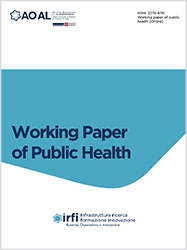COVID-19 and autoimmunity: a single center prospective follow-up study

All claims expressed in this article are solely those of the authors and do not necessarily represent those of their affiliated organizations, or those of the publisher, the editors and the reviewers. Any product that may be evaluated in this article or claim that may be made by its manufacturer is not guaranteed or endorsed by the publisher.
Objectives: In our recent study we reported the presence of autoantibodies in COVID-19 positive hospitalized patients. To verify whether these autoantibodies persisted over time and led to the development of chronic autoimmune diseases, we conducted a follow-up study at 3 (t3) and 6 (t6) months after admission. Methodology: Thirteen of 40 patients enrolled in the previous study gave their consent to participate in this new protocol. The same autoimmunity tests performed at the time of diagnosis were carried out in these patients. Results: In 9 patients, autoantibodies were still present at follow-up. Another one, negative at admission, developed strong positivity for ANA and Mi2-β and Ku antigens at t3 and at t6. Only one showed the presence of de novo circulating autoantibodies at t3. Finally, we observed that two patients were always negative for the whole observation period. Conclusions: Our data show that after 6 months, the autoantibodies are still present in the majority of our enrolled population. Further investigations will be necessary in order to verify whether these patients will become negative over time or may develop clinical symptoms coesistent with autoimmune disease. Finally, It will be important to understand whether an alteration of the autoimmune system can be considered effects of coronavirus (long COVID-19).
PAGEPress has chosen to apply the Creative Commons Attribution NonCommercial 4.0 International License (CC BY-NC 4.0) to all manuscripts to be published.

 https://doi.org/10.4081/wpph.2021.9298
https://doi.org/10.4081/wpph.2021.9298




